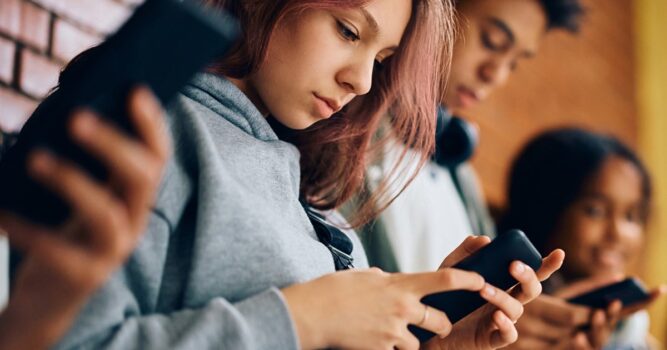Social media and personal device use play a major and increasingly important role in the education environment. To explore their implications, including the impact our members have observed in school settings and what concerns them the most, the National Education Association conducted a survey of 2,889 members working in elementary, middle, and high schools in the spring of 2024.
The survey identified concerns in four main areas: student mental health, student safety and behavior, social skill development, and learning environments. The survey also identified the policy solutions NEA members support. As noted in more detail in the attached memo from GBAO, the firm that conducted the poll on behalf of NEA:
Over 90 percent of educators feel students’ mental health is a serious issue at their school, and a majority say there has been a significant increase in concerns related to student mental health in the past few years. Top contributing factors to incidents or concerns related to student mental health include social media, personal device use, and lack of mental health staffing in schools. Bullying was a particular concern in middle schools.
The vast majority of NEA members say that students cannot concentrate, are acting out, and are frequently absent from school. NEA members see a lack of student motivation and negative student behavior both toward peers and educators.
The negative impact of student social media use troubles NEA members. NEA members worry that student social media use leads to cyberbullying and underdeveloped social skills. The NEA polling results are consistent with recent findings by the American Psychological Association (APA), whose own concerns related to social media rest in part on youths’ neurological hypersensitivity and susceptibility to social media feedback, praise, and harmful content
.
Educators who work in schools that allow personal device use find it very disruptive. An overwhelming majority of NEA members—90 percent—support school policy prohibiting cell phone/personal devices during instructional time, and 83 percent support prohibiting cell phone/personal device usage during the entire school day with exceptions for things like medical or assistive-technology needs. NEA members identify educators and parents as important to the process of developing local policy on personal device use in schools, and members show little support for the federal government developing such policy.
NEA members voice broad support for the federal and state governments requiring social media companies to make changes to protect student safety and privacy.
The NEA survey’s findings underscore the importance of developing strong local policies on personal device usage in schools, continuing to bring attention to the harms of social media, advocating for actionable strategies to protect the health and safety of Pre-K-12 students, and bolstering learning environments. NEA will continue to do so based on these three principles:
Social media companies must stop prioritizing profits over the safety and privacy of children. We are well past the time when social media companies can be trusted to do so on their own. We need federal and state laws to protect children, including an end to excessive data collection, disruptive notifications and nudges, design choices that encourage excessive use and doom-scrolling, the promotion of extremism and violence, and the facilitation of predatory behavior. For these reasons, NEA supports the federal Kids’ Online Safety Act and state-based Age Appropriate Design Code initiatives.
Social media companies must be transparent when it comes to the impact of their products on minors. Federal support for independent research and federal oversight of social media companies’ algorithmic practices will help protect children’s health, wellbeing, safety, and privacy.
Educators should promote through collective bargaining and other labor-management engagement strong school-wide, locally crafted policies restricting access to personal devices during the school day. Policies should be developed in consultation with educators and parents/guardians and factor in appropriate exceptions for concerns including medical and disability-related needs. Enforcement must not be left up to individual educators and should never rely on policing or other actions that criminalize student behavior. School districts should adopt and enforce policies and clearly communicate the reasons and enforcement mechanisms to help build consensus.
For additional information, please contact the Health and Safety Program within NEA’s Education Policy and Implementation Center (EPIC): [email protected].









